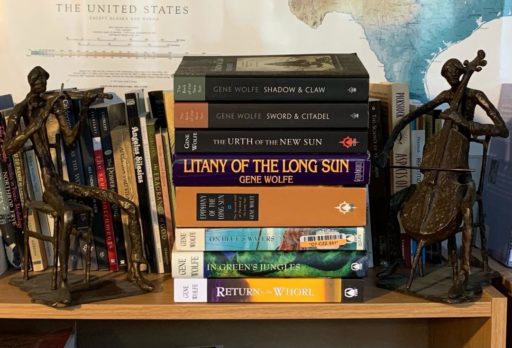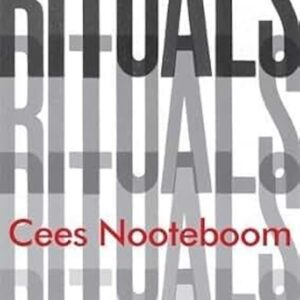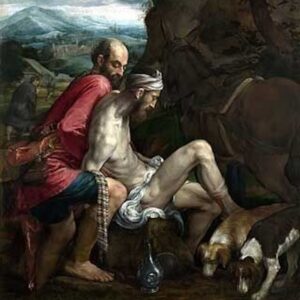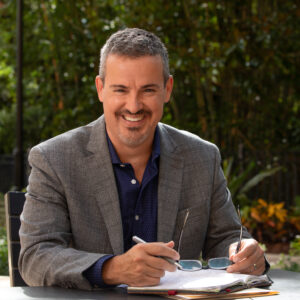I meant to be writing this post on Kirstin Valdez Quade’s The Five Wounds, an intense novel set over Lent, and published this past Holy Week. The novel grew from a short story of the same title. From a formal perspective, that is fascinating, but I am as or more interested in the religious aspect of the book—which is of course related to the formal aspect, just as the vast edifice of Christianity is related to the ‘short story’ of the Passion. But that post is not yet to be, for I have been distracted—by a mere sight, but one that pulls my spirit back to adolescence and to a combination of thrill and yearning I did not know I was still able to experience.
The sight in question is a pile of books on my shelf. There are eight volumes: six paperback and two hardback. These eight volumes contain twelve separate novels disposed into a tetralogy and its stand-alone sequel, a further tetralogy, and a final trilogy. The books were published over roughly the final two decades of the twentieth century and stand, I am told, as one of the great achievements of Catholic fiction, and of fiction altogether, in the last hundred years.
I am describing Gene Wolfe’s magnum opus, the epic ‘science-fantasy’ known altogether as the Solar Cycle, for the series which comprise it are called The Book of the New Sun (with its sequel The Urth of the New Sun), The Book of the Long Sun, and The Book of the Short Sun. Of these, I have read only the first four novels (the top two volumes of my pile), the Book of the New Sun. That was over a decade ago: now I am re-reading them, and will move on through the rest of the Solar Cycle when I finish. This is a task I have been meaning to undertake since I began the series all those years ago. It has taken my book in progress to lead me to finally acquire the entire Solar Cycle and commit myself to finishing it. I was expecting to be excited at the prospect, because there is plenty here to capture my attention. But my feeling at the sight of all the series assembled together exceeds a merely intellectual reaction.
First, though, let me say what is simply interesting to me about Wolfe’s sweeping far-future, baroque, densely allusive roman-fleuve. I heard of Gene Wolfe when I was in my late twenties and trying to gum up the courage to ditch a PhD program in English. I had been trying to write a dissertation that was to be on Edmund Spenser’s romance epic The Faerie Queene, but I wanted to write on that pinnacle of Renaissance literature in conjunction with the very modern genre of fantasy fiction. My supervisors said NO, so I quit.
Possibly not the best move, career-wise, but it did give me the freedom to read as I chose. And what I chose was a return to my roots as a writer and reader: I would go back to fantasy. It was a genre I had abandoned out of embarrassment when I first arrived in college. Back then, nothing sci-fi/fantasy was respectable. The Harry Potter and Lord of the Rings films then coming out or soon to come out did a lot to change that state of affairs. But for me in the year 2000, the only respectable literary way to stay within the ambit of fantasy was to study classical and medieval literature. So that’s what I did professionally for a decade.
By the time I came to work on the dissertation, there was talk in academic circles of taking so-called genre fiction seriously, but then (as now) it was mostly just talk. I expect it will remain this way for the foreseeable future, because the only thing that could make literary academics take genre fiction seriously would be if literary academics as a whole started taking metaphysics seriously. Genre fiction, the heir of classical and medieval literary traditions (even while being a distinctly modern form) is—or was until recently—inherently serious about metaphysics. That is why so many of its greatest practitioners have been religious adherents.
Like Gene Wolfe, for example, a Catholic…, Lewis Carroll, George MacDonald, Arthur Machen, Hope Mirrlees, J. R. R. Tolkien, R. A. Lafferty, Madeleine L’Engle, Avram Davidson, Dorothy Sayers and P. D. James and Agatha Christie, Robert Jordan, J. K. Rowling—all these seminal masters of genre fiction were religiously observant or formed, and some that were not—for example the visionary prose stylist and peer of the Inklings E. R. Eddison, or the master fantasist of Taoist persuasion, Ursula Le Guin—nonetheless took metaphysics and imagination to be genuinely transcendent.
Well, then, as a man of religion and a fantasist (to me, the one term is a restatement of the other), it’s high time I completed my reading of Wolfe’s dodecalogue. But that’s laying it all out rationally. What actually happened when I had acquired all the books and stacked them up on my shelf the other day was more feeling and memory than thought. I remembered well back of my university education to boyhood, when the sight of a whole fantasy series arrayed on a shelf—the shelf of an actual bookstore or library, just think of that tangible, olfactory life, fast disappearing even before Covidtide!—that sensation seemed to promise something, to open world upon world or to reveal—but only by hinting at—the beauty of a whole cosmos.
I sometimes think of the closing decades of the last century as the last high-water mark of fantasy fiction. The genre is still thriving, of course, at least if it is defined by the presence of so-called supernatural elements. But beneath superficial continuity, its nature is changing, I think. That old connection via the metaphysical and symbological to the ancient Western literary tradition is lapsing. As fantasy grows more diverse, its core motivation and intention grow diffuse and dissipated. Sometimes that’s how it seems to me, and I wonder if other long-time readers of fantasy and other genre fiction feel the same.
Anyway I feel lucky to have been a new reader when I was, making many trips to bookstores and libraries, where I would sit gazing at the covers of fantasies written by C. J. Cherryh, Robin Hobb, Elizabeth Moon, Mary Stewart, Stephen R. Donaldson, Melanie Rawn, Patricia McKillip, Tad Williams, Terry Goodkind, David Eddings, Anne McCaffrey, Evangeline Walton, Roger Zelazny, and many others: a rich profusion among which to make one’s choice of world and quest, every option endowed with highest stakes and scope of adventure.
Now I feel this excitement again, looking at my pile of Gene Wolfe’s books. I was too miserable (probably because still too intellectual) when I first started the Solar Cycle. Now, possibly from having children of my own, I seem to have reverted to an old capacity for reading wonder, which as I say is a kind of faithful reading—lectio divina, as the medievals called it—precisely because it is so full of promise, that potent mixture of the desired and the mysterious.
Jonathan Geltner lives in Ann Arbor MI with his wife and two sons. His translation of Paul Claudel’s Five Great Odes is available from Angelico Press and a novel, Absolute Music, is forthcoming from Slant. He writes more about the meeting of fantasy and fiction with theology, philosophy, music and the sense of place at betweentwomaps.com





